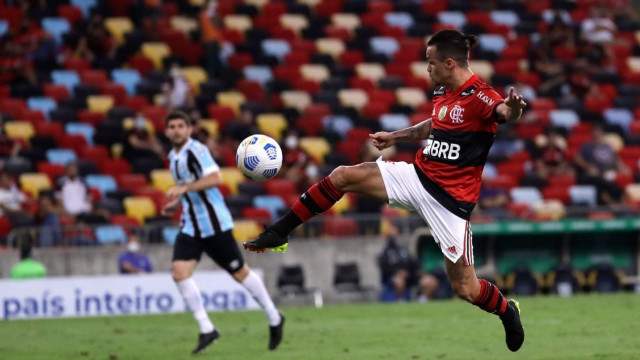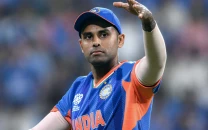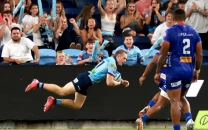Brazilian clubs leave Copa Libertadores rivals in their wake
This season's semi-finals kick off next week, between Palmeiras and Atletico Mineiro while Flamengo welcomes Ecuador

While Brazil's national team marches on towards a place at next year's World Cup with a 100 percent record in South American qualifying, the country's clubs are dominating the Copa Libertadores, making the most of their unrivalled financial power on the continent and a conveyor belt of young talent.
For the first time since the South American equivalent of the Champions League was created in 1960, three teams from the same country have made it through to the semi-finals.
In 1966 the Argentine trio of River Plate, Boca Juniors and Independiente all took part in the semi-final stage, but that was split into groups and so cannot be compared to 2021.
This season's semi-finals kick off next week, with the first leg of the all-Brazilian affair between Palmeiras and Atletico Mineiro in Sao Paulo on Tuesday being followed on Wednesday by Flamengo welcoming Barcelona of Ecuador to the Maracana.
If Flamengo, the Rio de Janeiro giants who won the Copa Libertadores in 2019, make it to the final in Montevideo on November 27, it will be another all-Brazilian showdown, just as it was last year when Palmeiras beat Santos.
Brazil's population of over 200 million is almost half that of the entire continent and so it is hardly a surprise that its teams should do so well, but there are other explanations for the country's current pre-eminence.
"Brazilian football is evolving, leading players are coming back to the country and the league is becoming more and more competitive," said Brazil midfielder Lucas Paqueta, formerly of Flamengo and now of Lyon in France, recently.
Big-name Brazilian players have been returning to the top flight, the Brasileirao, with Atletico Mineiro bringing back Hulk earlier this year and last month signing former Atletico Madrid striker Diego Costa, a Spanish international but who was born in Brazil.
Centre-back David Luiz, released by Arsenal, has returned home to sign for Flamengo. Fellow former Chelsea and Arsenal star Willian has gone back to Corinthians.
These former Brazil internationals command big salaries, the kind of money that financially troubled clubs elsewhere in South America could not dream of paying.
"Brazilian clubs can attract big-name players because they can pay much more money," says Leonardo Bertozzi, a commentator for ESPN Brasil.
The financial gulf can be partly explained by the difference in television rights deals in Brazil compared to neighbouring countries -- in 2019 Brazilian top-flight teams pocketed $253 million while the figure was just $91 million in Argentina.
In the last decade they have spent $800 million in the transfer market, almost double the amount invested by clubs in Argentina, which remains the most successful nation in the history of the Copa Libertadores with 25 titles, to 20 for Brazil.
"The other clubs in South America cannot compete with the Brazilians. One of the most striking examples was when Atletico Mineiro signed Ignacio Fernandez from River Plate," says Bertozzi of the 31-year-old Argentina playmaker who moved to Belo Horizonte in February.
Most clubs in Brazil are heavily in debt, but they can still afford to buy top talent from neighbouring countries, and these players are often then sold on at a profit to Europe.
Given its population it is also no surprise that the country still brings through an endless stream of young talent.
Brazil is by a distance the world's biggest exporter of footballers with around 1,300 players plying their trade abroad according to the International Centre for Sports Studies, based in Neuchatel, Switzerland.
"Brazil has always had a rich seam of players, whether they are based at home or in Europe," points out Alex Sandro, the Juventus and Brazilian international full-back.
Palmeiras triumphed in last year's Copa Libertadores largely thanks to young talents like Gabriel Menino, Danilo and Patrick de Paula.
Atletico Mineiro's squad includes 24-year-old Brazilian Olympic champion Guilherme Arana and Flamengo have Pedro, who is the same age.
Of the 10 clubs who have sold the most players in South America in the last decade, six of them are in Brazil.
The money earned can then be reinvested in new signings, and the cycle begins again.
"You can expect to see Brazilian teams win most South American tournaments in the years to come," predicts Bertozzi.



















COMMENTS
Comments are moderated and generally will be posted if they are on-topic and not abusive.
For more information, please see our Comments FAQ